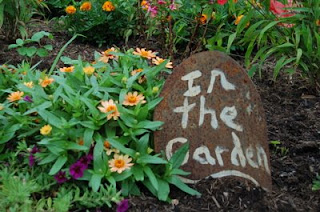
I love cooking with herbs, fresh, fragrant, delicious. I used to be forever going to the grocers and other shops hunting for bunches of fresh mint, basil, oregano, bay leaves, chives, in fact most herbs…
My Windowsill Herb GardenNow I grow my own herbs on the windowsill. Well, to be more accurate it is a table by the window and I still don't have corriander or oregano, but it has revolutionised cooking and taking care of, snipping and using the homegrown herbs is a great feeling.
Now I was suspicious at first, after all, growing herbs indoors seemed a bit lame…but I live in a sunny flat and I've always wanted to give it a go. I've gradually built up the collection but now have several basil plants, some mint and chives grown from splitting and repotting "growing herbs" from the Coop, and some plants from Dobbies (Garden Centre): a largish pot of garden mint, a small black peppermint plant, thyme, lemon thyme, marjoram, rosemary and parsley. In the kitchen I've also got my Bay tree and some chives.
All the herbs are a couple of months old now, and they are all doing very well. For the small expense at the garden centre, I've got more herbs than I need and they are growing strongly. Even my attempts to repot individual basil and mint plants from the shops has been a massive success. We've had plenty of basil for tomato sauces, cheese sandwiches and other pasta and vegetable dishes…we've also been drinking up plenty of fresh mint tea in the evenings and have made mint sauce and Laab (thai salad) with the growing mint too. In fact, the more I use the herbs, the more they grow…it's been a real time and money saver all in all, and a very tasty one too!
Where to grow themI grow most of the herbs in a sunny (south facing) window of a small room - door closed most of the time, it's my personal greenhouse. The room is not draughty at all and gets quite hot in the summer sun.
The bay tree is happy in the kitchen, again by the window, although this is a North North West (ish!) facing window , it does get some evening sunshine, but only a touch - and it's loving it there where there is plenty of light. It has been growing like mad.
Growing Herbs anyone? If you tend to buy pots of growing herbs, I would recommend getting them out of those poky wee pots and splitting up the best seedlings into larger pots of compost, 3 or 4 basil plants to a pot, more for mint or chives. I usually stick all the weedier seedlings back in the original pot and use them first, giving the better plants a chance to develop. When you're cropping the plants, remove a whole stem, say above the first two leaves…the plant literally grows two stems where you cut one off, so you should have loads of herbs within weeks. Basil and mint have worked particularly well as I use them most often. Of course you have to feed the plants once in a while, I've been recomended Tomorite and will be watering them with a weak solution once a week.
Herbs: The Windowsill Garden 8 June 2006
Posted by cath in Info and Cooks Notes, Recipes, general info, herbs, ingredients.
http://cookalicious.wordpress.com/2006/06/08/herbs-the-windowsill-garden/Text info
http://someknowledge.wordpress.com/2008/03/29/indoor-herb-gardening/Short videos...
http://www.youtube.com/watch?v=39ZTdebKs5E
http://www.youtube.com/watch?v=nfnZ1CP5hPw
http://www.youtube.com/watch?v=OFb98tn4eQo
 Honest Food is food grown using sustainable farming methods. Since not everyone knows what that is I tell customers that we raise on the farm is grown pretty much the same way our grandparents grew their food. In other words, without synthetic chemicals and with a lot of composted horse manure.
Honest Food is food grown using sustainable farming methods. Since not everyone knows what that is I tell customers that we raise on the farm is grown pretty much the same way our grandparents grew their food. In other words, without synthetic chemicals and with a lot of composted horse manure.










